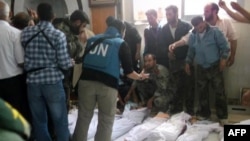CAIRO - The United Nations Security Council Sunday unanimously condemned the Syrian government for last week's brutal massacre of at least 108 people, including many children, in Houla, even as Damascus denied its armed forces were responsible.
The 15-nation council said Sunday the attacks "involved a series of government artillery and tank shellings on a residential neighborhood" and again demanded that President Bashar al-Assad withdraw heavy weapons from Syrian towns.
The council also "condemned the killing of civilians by shooting at close range and by severe physical abuse" and said Syria's "outrageous use of force" against its own population is a "violation of applicable international law."
The statement, agreed to by Syrian ally Russia, called for those responsible to be held accountable.
Earlier Sunday, the U.N. mission chief in Syria told an emergency council session that about 108 people - including 49 children under the age of 10 - were killed in the attack. General Robert Mood, speaking via video-link from Damascus, said another 300 people were wounded in the incident.
U.N. observers had initially counted 92 dead in Houla.
International officials have largely blamed the government for Friday's massacre, but Syria has said it was carried out by rebel fighters.
Foreign Ministry Spokesman Jihad Makdissi Sunday called accusations against the Syrian government a "tsunami of lies." Instead, he blamed "hundreds of heavily armed gunmen" who he claimed attacked soldiers.
Those troops, he argues, did not leave their positions except to defend themselves during a nine-hour attack, as armed men allegedly burned houses and killed civilians.
But U.N. observers confirmed that artillery and tank shells - which only government forces have - were fired at residential areas of Houla, northwest of Homs. In a letter to the Security Council, U.N. chief Ban Ki-moon also said monitors had observed signs of shotgun wounds on some of the bodies.
Activists from Houla say government forces peppered the area with mortar shells after large demonstrations against the government on Friday. They say that evening pro-Syrian fighters known as shabiha stormed Houla's three villages, gunning down men in the streets at point-blank range and stabbing women and children in their homes.
The massacre marks the deadliest single attack since Syria's anti-government uprising began about 15 months ago.
Images of bloodied and lifeless young bodies, laid carefully side by side after Friday's onslaught, triggered shock around the world and underlined the failure of a six-week-old U.N. cease-fire plan to stop the violence.
International envoy Kofi Annan, who brokered the peace plan, is expected in Syria on Monday.
The U.N. High Commissioner for Human Rights, Navi Pillay, said Sunday the "indiscriminate and possibly deliberate" killing of villagers in the Houla area may mount to crimes against humanity or other forms of international crime.
Arab and western governments have issued statements expressing outrage and putting the blame squarely on Mr. Assad's government.
The White House said it was horrified by credible reports of brutal attacks on women and children in Houla. EU foreign policy chief Catherine Ashton Sunday spoke of a "heinous act perpetrated by the Syrian regime against its own civilian population."
Angry protests over the killings continued across parts of Syria on Sunday, including the capital Damascus, where security forces fired on protesters in the Midan district. Demonstrations also took place in the southern city of Daraa.
Arab satellite channels showed an amateur video of a resident of that village, Teldau, meeting with a U.N. observer team and complaining about the cruel behavior of government forces.
"My God, we are men," he says, "we are men and they are killing us as if we were less than donkeys." "We were created by God," he insists. "Can it be that they are not God-fearing men?”
Khattar Abou Diab, who teaches political science at the University of Paris, says the Syrian government has a long history of using brutality and repression to deal with opposition.
He argues the government has a bad habit of using brutal force to put down rebellions, such as the one in Hama in 1982, which killed thousands of people, as well as brutality against prisoners. Abou Diab adds the Assad government has done everything possible to militarize the current conflict and turn it into a sectarian affair in order to remain in power.
General Mood urged the government and the opposition to put an end to the violence. He did not directly blame either side for Friday's massacre, but noted government tanks had fired at houses inside one of the villages where the massacre took place.
The rebel Free Syrian Army warned it will not adhere to the U.N.-mediated peace plan if the international community does not take concrete actions to protect citizens. The head of the exile Syrian National Council, Burhan Ghalioun, also condemned the killings.
Makdissi called the Houla assault "brutal" and said the Syrian government has launched an investigation.
Syrian troops shelled residential areas Sunday in the central city of Hama, and the rebel-held town of Rastan, killing at least 14 civilians.
The United Nations says more than 10,000 people have been killed in Syria since the government began its crackdown on dissent in March 2011.
Some information for this report was provided by AP, AFP and Reuters.





